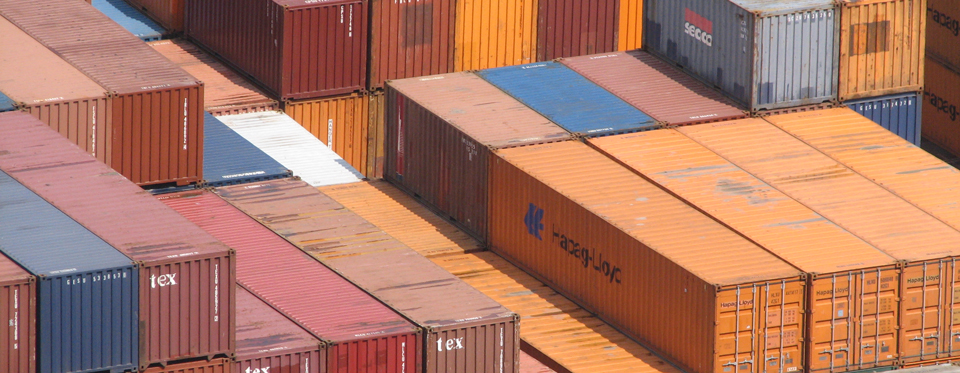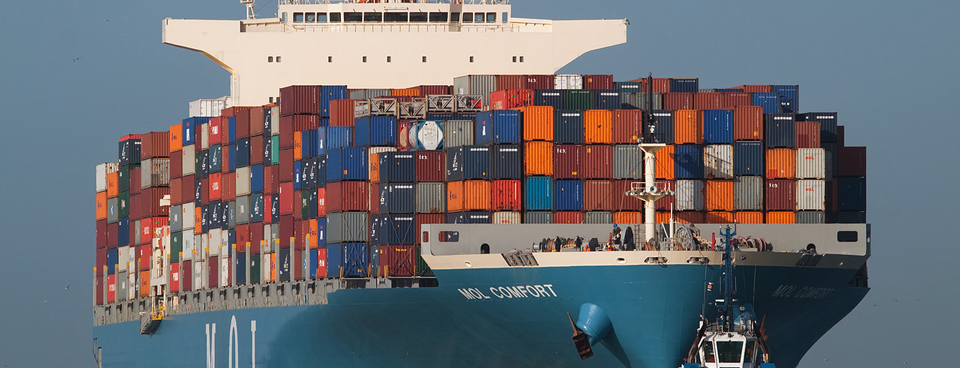

STANDART CONTAINERS
20' DV:
Inside length - 5.900 m
Inside width - 2.350 m
Inside height - 2.393 m
Door width - 2.342 m
Door height - 2.280 m
Capacity - 33.2 Cu.m
Tara weight - 2,230 Kgs
Maxi cargo - 21,770 Kgs
40' DV:
Inside length - 12.036 m
Inside width - 2.350 m
Inside height - 2.392 m
Door width - 2.340 m
Door height - 2.280 m
Capacity - 67.7 Cu.m
Tara weight - 3,700 Kgs
Maxi cargo - 26,780 Kgs
40' High Cube:
Inside length - 12.036 m
Inside width - 2.350 m
Inside height - 2.697 m
Door width - 2.338 m
Door height - 2.585 m
Capacity - 76.3 Cu.m
Tara weight - 3,970 Kgs
Maxi cargo - 26,510 Kgs
REEFER CONTAINERS
20' Reefer:
Inside length - 5.425 m
Inside width - 2.275 m
Inside height - 2.260 m
Door width - 2.258 m
Door height - 2.216 m
Capacity - 28.3 Cu.m
Tara weight - 3,200 Kgs
Maxi cargo - 20,800 Kgs
40' Reefer:
Inside length - 11.493 m
Inside width - 2.270 m
Inside height - 2.197 m
Door width - 2.282 m
Door height - 2.155 m
Capacity - 57.8 Cu.m
Tara weight - 4,900 Kgs
Maxi cargo - 25,580 Kgs
40' High Cube Reefer:
Inside length - 11.557 m
Inside width - 2.294 m
Inside height - 2.500 m
Door width - 2.294 m
Door height - 2.440 m
Capacity - 66.6 Cu.m
Tara weight - 4,500 Kgs
Maxi cargo - 25,980 Kgs
OPEN TOP CONTAINERS
20' Open Top:
Inside length - 5.894 m
Inside width - 2.311 m
Inside height - 2.354 m
Door width - 2.286 m
Door height - 2.184 m
Capacity - 32.23 Cu.m
Tara weight - 2,400 Kgs
Maxi cargo - 21,600 Kgs
40' Open Top:
Inside length - 12.028 m
Inside width - 2.350 m
Inside height - 2.345 m
Door width - 2.341 m
Door height - 2.274 m
Capacity - 65.5 Cu.m
Tara weight - 3,850 Kgs
Maxi cargo - 26,630 Kgs
FLAT RACK CONTAINERS
20' Flat rack:
Inside length - 5.620 m
Inside width - 2.200 m
Inside height - 2.233 m
Tara weight - 2,530 Kgs
Maxi cargo - 21,470 Kgs
40' Flat rack:
Inside length - 12.080 m
Inside width - 2.438 m
Inside height - 2.103 m
Tara weight - 5,480 Kgs
Maxi cargo - 39,000 Kgs
TANK CONTAINERS
Tank container:
Length - 6.058 m
Width - 2.438 m
Height - 2.591 m
Capacity - 24.000 l
Tara weight - 3620 kg - 4220 kg
Maxi cargo - 31000 kg
CONTAINERS FOR BULK CARGO
20':
Length - 6.058 m
Width - 2.438 m
Height - 2.591 m
Inside length - 5.838 m
Inside width - 2.366 m
Inside height - 2.374 m
Door width - 280 mm x 300 mm
Door height - 2,144 mm x 500 mm
Hatch width - 500 mm
Tara weight - 2540 kg
Maxi cargo - 28030 kg
Incoterms or international commercial terms are a series of international sales terms widely used throughout the world. They are used to divide transaction costs and responsibilities between buyer and seller and reflect state-of-the-art transportation practices. They closely correspond to the U.N. Convention on Contracts for the International Sale of Goods.
Group E - Departure:
EXW. Ex Work (named place): the seller makes the goods available at his premises.
Group F - Main Carriage Unpaid:
FCA. Free Carrier (named place): the seller hands over the goods, cleared for export, into the custody of the first carrier (named by the buyer) at the named place. This term is suitable for all modes of transport, including carriage by air, rail, road, and containerised / multi-modal transport.
FAS. Free Alongside Ship (named loading port): free Alongside Ship: the seller must place the goods alongside the ship at the named port. The seller must clear the goods for export; this changed in the 2000 version of the Incoterms. Suitable for maritime transport only.
FOB. Free On Board (named loading port): the classic maritime trade term, Free On Board: seller must load the goods on board the ship nominated by the buyer, cost and risk being divided at ship's rail. The seller must clear the goods for export. Maritime transport only.
Group C - Main Carriage Paid:
CFR. Cost and Freight (named destination port): seller must pay the costs and freight to bring the goods to the port of destination. However, risk is transferred to the buyer once the goods have crossed the ship's rail. Maritime transport only.
CIF. Cost, Insurance and Freight (named destination port): exactly the same as CFR except that the seller must in addition procure and pay for insurance for the buyer. Maritime transport only.
CPT. Carriage Paid To (named place of destination): the general/containerised/multimodal equivalent of CFR. The seller pays for carriage to the named point of destination, but risk passes when the goods are handed over to the first carrier.
CIP. Carriage and Insurance Paid To (named place of destination): the containerised transport/multimodal equivalent of CIF. Seller pays for carriage and insurance to the named destination point, but risk passes when the goods are handed over to the first carrier.
Group D - Arrival:
DAF. Delivered At Frontier (named place): It can be used when the goods are transported by rail and road. The seller pays for transportation to the named place of delivery at the frontier. The buyer arranges for customs clearance and pays for transportation from the frontier to his factory. The passing of risk occurs at the frontier.
DES. Delivered Ex Ship (named port):Where goods are delivered ex ship, the passing of risk does not occur until the ship has arrived at the named port of destination and the goods made available for unloading to the buyer. The seller pays the same freight and insurance costs as he would under a CIF arrangement. Unlike CFR and CIF terms, the seller has agreed to bear not just cost, but also Risk and Title up to the arrival of the vessel at the named port. Costs for unloading the goods and any duties, taxes, etc… are for the Buyer. A commonly used term in shipping bulk commodities, such as coal, grain, dry chemicals - - - and where the seller either owns or has chartered, their own vessel.
DEQ. Delivered Ex Quay (named port): It means the same as DES, but the passing of risk does not occur until the goods have been unloaded at the port of destination.
DDU. Delivered Duty Unpaid (named destination place): It means that the seller delivers the goods to the buyer to the named place of destination in the contract of sale. The goods are not cleared for import or unloaded from any form of transport at the place of destination. The buyer is responsible for the costs and risks for the unloading, duty and any subsequent delivery beyond the place of destination. However, if the buyer wishes the seller to bear cost and risks associated with the import clearance, duty, unloading and subsequent delivery beyond the place of destination, then this all needs to be explicitly agreed upon in the contract of sale.
DDP. Delivered Duty Paid (named destination place): It means that the seller pays for all transportation costs and bears all risk until the goods have been delivered and pays the duty. Also used interchangeably with the term "Free Domicile"
